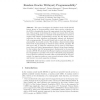122 search results - page 7 / 25 » Practical Threshold Signatures Without Random Oracles |
144
Voted
CISC
2008
Springer
15 years 4 months ago
2008
Springer
One of the important applications of digital signature is anonymous credential or pseudonym system. In these scenarios, it is essential that the identity of the signer is kept secr...
137
Voted
ICISC
2004
15 years 4 months ago
2004
An identity (ID)-based signature scheme allows any pair of users to verify each other's signatures without exchanging public key certificates. With the advent of Bilinear maps...
116
click to vote
EUROCRYPT
2001
Springer
15 years 7 months ago
2001
Springer
Abstract. Known practical blind signature schemes whose security against adaptive and parallel attacks can be proven in the random oracle model either need five data exchanges bet...
117
click to vote
IJNSEC
2008
15 years 2 months ago
2008
The devastating consequence of secret key exposure in digital signature is that any signature can be forged and cannot be trusted. To mitigate the damage of secret key exposure, f...
144
Voted
ASIACRYPT
2010
Springer
15 years 18 days ago
2010
Springer
This paper investigates the Random Oracle Model (ROM) feature known as programmability, which allows security reductions in the ROM to dynamically choose the range points of an ide...

